This article has multiple issues. Please help improve it or discuss these issues on the talk page . (Learn how and when to remove these template messages)
|

Ahafo are Akan people who live in Ghana.
This article has multiple issues. Please help improve it or discuss these issues on the talk page . (Learn how and when to remove these template messages)
|

Ahafo are Akan people who live in Ghana.

Human sexual activity, human sexual practice or human sexual behaviour is the manner in which humans experience and express their sexuality. People engage in a variety of sexual acts, ranging from activities done alone to acts with another person in varying patterns of frequency, for a wide variety of reasons. Sexual activity usually results in sexual arousal and physiological changes in the aroused person, some of which are pronounced while others are more subtle. Sexual activity may also include conduct and activities which are intended to arouse the sexual interest of another or enhance the sex life of another, such as strategies to find or attract partners, or personal interactions between individuals. Sexual activity may follow sexual arousal.

Laos, officially the Lao People's Democratic Republic, is a socialist state and the only landlocked country in Southeast Asia. At the heart of the Indochinese Peninsula, Laos is bordered by Myanmar and China to the northwest, Vietnam to the east, Cambodia to the southeast, and Thailand to the west and southwest. Its capital and largest city is Vientiane.

Mao Zedong, also known as Chairman Mao, was a Chinese communist revolutionary who was the founder of the People's Republic of China (PRC), which he led as the chairman of the Chinese Communist Party from the establishment of the PRC in 1949 until his death in 1976. Ideologically a Marxist–Leninist, his theories, military strategies, and political policies are collectively known as Maoism.

The Romani, colloquially known as the Roma, are an Indo-Aryan ethnic group, traditionally nomadic itinerants. They live in Europe and Anatolia, and have diaspora populations located worldwide, with significant concentrations in the Americas.
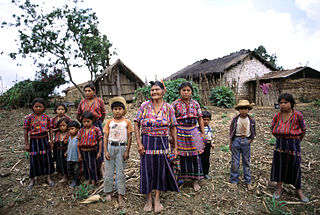
Indigenous peoples, also referred to as First peoples, First nations, Aboriginal peoples, Native peoples, Indigenous natives, or Autochthonous peoples, are culturally distinct ethnic groups whose members are directly descended from the earliest known inhabitants of a particular geographic region and, to some extent, maintain the language and culture of those original peoples. The term Indigenous was first, in its modern context, used by Europeans, who used it to differentiate the Indigenous peoples of the Americas from the European settlers of the Americas and from the Africans who were brought to the Americas as enslaved people. The term may have first been used in this context by Sir Thomas Browne in 1646, who stated "and although in many parts thereof there be at present swarms of Negroes serving under the Spaniard, yet were they all transported from Africa, since the discovery of Columbus; and are not indigenous or proper natives of America."
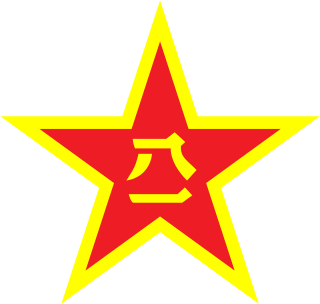
The People's Liberation Army (PLA) is the principal military force of the People's Republic of China and the armed wing of the Chinese Communist Party (CCP). The PLA consists of five service branches: the Ground Force, Navy, Air Force, Rocket Force, and Strategic Support Force. It is under the leadership of the Central Military Commission (CMC) with its chairman as commander-in-chief.

Queer is an umbrella term for people who are not heterosexual or cisgender. Originally meaning "strange" or "peculiar", queer came to be used pejoratively against those with same-sex desires or relationships in the late 19th century. Beginning in the late 1980s, queer activists, such as the members of Queer Nation, began to reclaim the word as a deliberately provocative and politically radical alternative to the more assimilationist branches of the LGBT community.
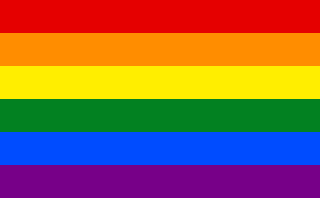
LGBT is an initialism that stands for lesbian, gay, bisexual, and transgender. In use since the 1990s, the initialism, as well as some of its common variants, functions as an umbrella term for sexuality and gender identity.

An ethnic group or an ethnicity is a grouping of people who identify with each other on the basis of shared attributes that distinguish them from other groups. Those attributes can include common sets of traditions, ancestry, language, history, society, culture, nation, religion, or social treatment within their residing area. Ethnicity is sometimes used interchangeably with the term nation, particularly in cases of ethnic nationalism, and is separate from the related concept of races.
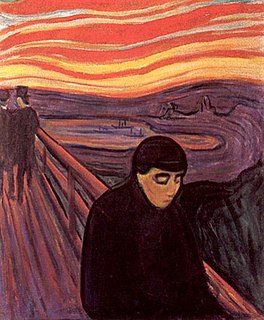
Borderline personality disorder (BPD), also known as emotionally unstable personality disorder (EUPD), is a personality disorder characterized by a long-term pattern of unstable interpersonal relationships, distorted sense of self, and strong emotional reactions. Those affected often engage in self-harm and other dangerous behaviors, often due to their difficulty with returning their emotional level to a healthy or normal baseline. They may also struggle with a feeling of emptiness, fear of abandonment, and detachment from reality. Symptoms of BPD may be triggered by events considered normal to others. BPD typically begins by early adulthood and occurs across a variety of situations. Substance use disorders, depression, and eating disorders are commonly associated with BPD. Some 8 to 10% of people affected by the disorder may die by suicide. The disorder is often stigmatized in both the media and the psychiatric field and as a result is often underdiagnosed.

Pansexuality is sexual, romantic, or emotional attraction towards people regardless of their sex or gender identity. Pansexual people may refer to themselves as gender-blind, asserting that gender and sex are not determining factors in their romantic or sexual attraction to others.

James Warren Jones was an American preacher, political activist and mass murderer. He led the Peoples Temple, a new religious movement, between 1955 and 1978. In 1976, Jones privately self-identified as an atheist. In what he called "revolutionary suicide", Jones and the members of his inner circle orchestrated a mass murder–suicide in his remote jungle commune at Jonestown, Guyana, on November 18, 1978. Jones and the events which occurred at Jonestown have had a defining influence on society's perception of cults.
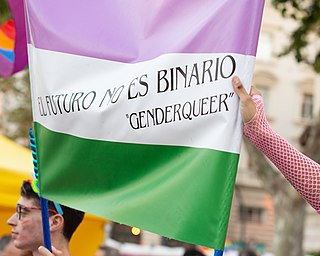
Non-binary or genderqueer is an umbrella term for gender identities that are not solely male or female—identities that are outside the gender binary. Non-binary identities fall under the transgender umbrella, since non-binary people typically identify with a gender that is different from their assigned sex, though some non-binary people do not consider themselves transgender.

People is an American weekly magazine that specializes in celebrity news and human-interest stories. It is published by Dotdash Meredith, a subsidiary of IAC. With a readership of 46.6 million adults in 2009, People had the largest audience of any American magazine, but it fell to second place in 2018 after its readership significantly declined to 35.9 million. People had $997 million in advertising revenue in 2011, the highest advertising revenue of any American magazine. In 2006, it had a circulation of 3.75 million and revenue expected to top $1.5 billion. It was named "Magazine of the Year" by Advertising Age in October 2005, for excellence in editorial, circulation,and advertising. People ranked number 6 on Advertising Age's annual "A-list" and number 3 on Adweek's "Brand Blazers" list in October 2006.
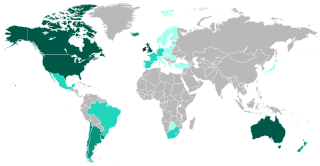
The Irish are an ethnic group and nation native to the island of Ireland, who share a common history and culture. There have been humans in Ireland for about 33,000 years, and it has been continually inhabited for more than 10,000 years. For most of Ireland's recorded history, the Irish have been primarily a Gaelic people. From the 9th century, small numbers of Vikings settled in Ireland, becoming the Norse-Gaels. Anglo-Normans also conquered parts of Ireland in the 12th century, while England's 16th/17th-century conquest and colonisation of Ireland brought many English and Lowland Scots to parts of the island, especially the north. Today, Ireland is made up of the Republic of Ireland and Northern Ireland. The people of Northern Ireland hold various national identities including British, Irish, Northern Irish or some combination thereof.

The Indigenous peoples of the Americas are the inhabitants of the Americas before the arrival of the European settlers in the 15th century, and the ethnic groups who now identify themselves with those peoples.
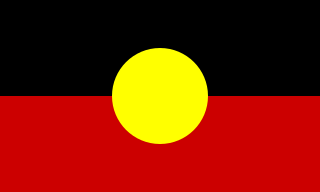
Aboriginal Australians are the various Indigenous peoples of the Australian mainland and many of its islands, such as Tasmania, Fraser Island, Hinchinbrook Island, the Tiwi Islands, and Groote Eylandt, but excluding the Torres Strait Islands. The term Indigenous Australians refers to Aboriginal Australians and Torres Strait Islanders collectively. It is generally used when both groups are included in the topic being addressed. Torres Strait Islanders are ethnically and culturally distinct, despite extensive cultural exchange with some of the Aboriginal groups. The Torres Strait Islands are mostly part of Queensland but have a separate governmental status.

Amyotrophic lateral sclerosis (ALS), also known as motor neuron disease (MND) or Lou Gehrig's disease, is a neurodegenerative disease that results in the progressive loss of motor neurons that control voluntary muscles. ALS is the most common type of motor neuron disease. Early symptoms of ALS include stiff muscles, muscle twitches, and gradual increasing weakness and muscle wasting. Limb-onset ALS begins with weakness in the arms or legs, while bulbar-onset ALS begins with difficulty speaking or swallowing. Half of the people with ALS develop at least mild difficulties with thinking and behavior, and about 15% develop frontotemporal dementia. Most people experience pain. The affected muscles are responsible for chewing food, speaking, and walking. Motor neuron loss continues until the ability to eat, speak, move, and finally the ability to breathe is lost. ALS eventually causes paralysis and early death, usually from respiratory failure.

A transgender person is someone who has a gender identity or gender expression that does not correspond with their sex assigned at birth. Many experience dysphoria from this incongruence, and seek to alleviate it through transitioning, often adopting a different name and set of pronouns in the process. Additionally, some undergo sex reassignment therapies such as hormone therapy and sex reassignment surgery to more closely align their primary and secondary sex characteristics with their gender identity, though not all desire these treatments, and others cannot access them for financial or medical reasons. Those who do desire to medically transition to another sex may identify as transsexual.
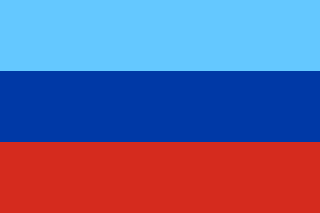
The Luhansk People's Republic, or Lugansk People's Republic, is a breakaway puppet quasi-state proclaimed within the territory of Ukraine, which is militarily occupied by Russia and Russian-backed separatists. The LPR claims the entirety of Ukraine's Luhansk Oblast within the Donbas region as its territory. The capital city of the LPR is Luhansk, which is also the de jure capital of the oblast.